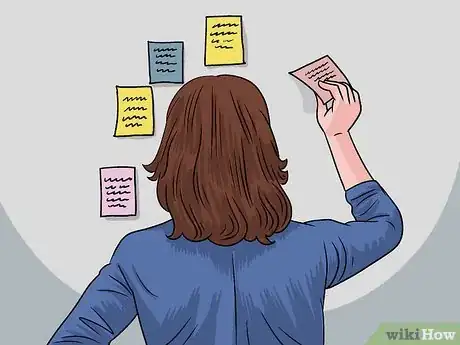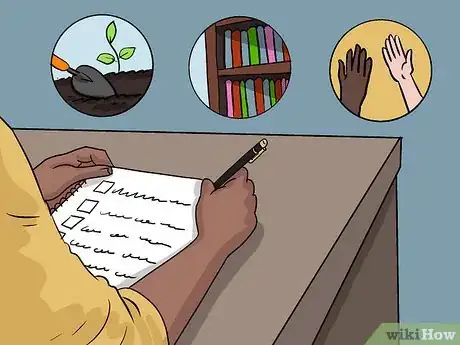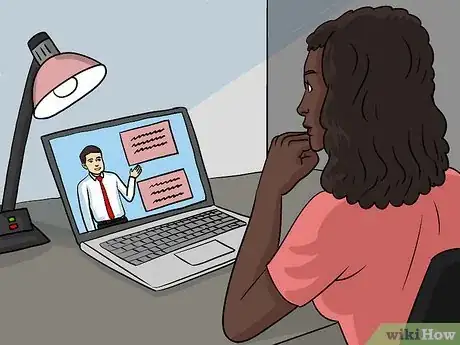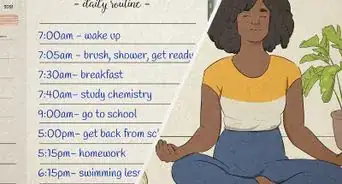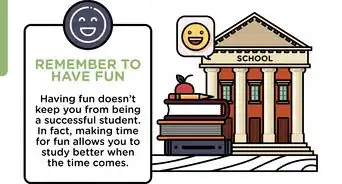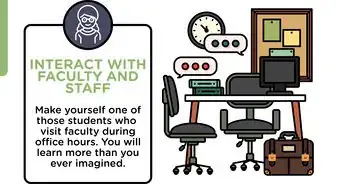This article was co-authored by Soren Rosier, PhD. Soren Rosier is a PhD candidate at Stanford's Graduate School of Education. He studies how children teach each other and how to train effective peer teachers. Before beginning his PhD, he was a middle school teacher in Oakland, California, and a researcher at SRI International. He received his undergraduate degree from Harvard University in 2010.
There are 9 references cited in this article, which can be found at the bottom of the page.
This article has been viewed 64,580 times.
Learning can be frustrating. Maybe you feel bored, or maybe you get discouraged if you don't understand a new topic. If you're still in school, there are lots of things you can do to make learning more enjoyable. Lifelong learning is also important. And even better, it can be fun. Take steps to continue your education even after you've left school. There are many ways to make learning fun.
Steps
Making School More Fun
-
1Find your learning style. Whether you are in junior high or college, you might be looking for ways to make learning more enjoyable. At times it can feel like your entire life revolves around classes and studying. If you are able to find your best learning style, you can make this experience more enjoyable.
- Everyone learns differently. Some people are visual learners, which means they learn best with images.
- If you think you are a visual learner, try to use that to your advantage. For example, in History class, rely heavily on the maps and timelines to help you retain and enjoy the information.
- You might be an aural learner. Do you enjoy listening to music and hearing people talk? Try setting the poems in your English class to a beat.
- If you are a verbal learner, you enjoy speaking out loud. Try practicing your Latin vocabulary by quizzing a friend.
EXPERT TIP"The best way to learn is to combine different elements at the same time, like listening to a lesson and looking at a visual on the wall."
Soren Rosier is a PhD candidate at Stanford's Graduate School of Education. He studies how children teach each other and how to train effective peer teachers. Before beginning his PhD, he was a middle school teacher in Oakland, California, and a researcher at SRI International. He received his undergraduate degree from Harvard University in 2010.
Soren Rosier, PhD
PhD in Education Candidate, Stanford University Soren Rosier, PhD
Soren Rosier, PhD
PhD in Education Candidate, Stanford University -
2Study with your friends. Maybe you don't enjoy learning because it feels like a solitary activity. One way to make it more enjoyable is to turn it into a group activity. Ask your friends to form a study group.[1]
- You and your friends can quiz each other for your mid-terms. You'll still be studying, but at least you will have company.
- Choose study partners who you enjoy being around. Just make sure that you will also focus on your work.
- Take turns choosing a location. Maybe you could ask some friends to meet you at a coffee shop for a study session. Next time, let your friend think of somewhere fun to go.
Advertisement -
3Ask for help. It makes sense that you will enjoy things that you are good at. Everyone likes feeling successful. If you are struggling in school, learning might feel less fun than it could be.[2]
- Ask a teacher for help. If you cannot comprehend your Chemistry class, ask your instructor for some additional materials. Once you understand the material, learning will feel less like a chore.
- Talk to the guidance counselor. Explain your likes and dislikes and find out if there are other classes you could be taking.
- Your parents can also be a great resource. Ask your mom to spend some time with you studying your Spanish homework. This might be a good way for you to bond with your family, which can be fun.
-
4Create goals. Getting an education can help you to succeed later in life. Try thinking about school as a way to help you find a career that you love. Take some time to reflect on what you would like to do when you are done with school. [3]
- Write down things that you like to do. For example, do you love being around animals? Maybe you want to pursue a career as a veterinarian.
- Ask your counselor to help you figure out which classes will help you prepare for your future goals. You will enjoy learning more if you view it as helping you to achieve your dream job.
- Make small goals and large goals. For example, you could write down "Get an A in Biology" as a short-term goal. "Get a scholarship to vet school" could be a longer-term goal.
-
5Choose topics you enjoy. If you are studying information that interests you, you will naturally enjoy learning more. When you are in high school and college, you will have some flexibility in choosing which classes to take. Take advantage of this opportunity to spend time doing what you enjoy.[4]
- Maybe you enjoy writing. If so, try to take some additional composition classes.
- Do you like art? Consider taking an Art History course.
- Have you always been fascinated by the Civil War? Look for a history class that focuses on that era.
-
6Participate in activities. Learning does not have to occur only in the classroom. Extracurricular activities are a great way to meet new people and learn new things. Consider joining a new club.[5]
- If you enjoy writing, consider joining the staff of the school paper. This is a great way to hone your skills.
- Maybe you have always loved to sing. Try out for choir or the school musical.
- You might find that you have a knack for critical thinking. You might really enjoy being on the debate team.
- Joining activities will also help you meet new people. These people can then become your study partners.
Continuing Your Education
-
1Find a new interest. Learning doesn't have to end once you are done with school. There are many ways that you can continue to expand your mind throughout your life. Finding a new interest can be very enjoyable.[6]
- Make a list of things that you like to do. Have you always enjoyed gardening? Spend some time learning more about it.
- Head to the library. Ask the reference librarian to help you find some useful books. Because you enjoy gardening, you will likely enjoy learning more about it.
- Join a club. Contact your local community center to find out if there are any local gardening groups you can join.
-
2Take a class. There are several options to continue your learning once you are no longer officially in school. Consider taking a class on a topic you enjoy. Contact your local community college to get some ideas.
- Many community colleges offer a wide variety of classes. Some options might include flower arranging, cooking, and music appreciation.
- Ask a friend to take the class with you. You can enjoy socialization and learning at the same time.
- Your local community center might have some good options, too. Have you always wanted to learn to swim? Take a class!
-
3Travel. You can learn a lot by visiting a new place. To enhance your learning, take some time to travel. You will have fun and expand your knowledge base.[7]
- Make a list of places you've always wanted to go. Start making plans to check items off of your list.
- Save your money. Create a travel fund so that you can begin your adventures.
- Visit a new country. You will learn new customs, see different architecture, and hear a new language.
- Take a road trip. Choose a museum within driving distance and head out. Love music? Head to Cleveland to the Rock and Roll Hall of Fame.
-
4Read a book. Reading is one of the best ways to learn new information. There are books available on every imaginable subject. Choose a topic, and find a book to begin learning some new things.[8]
- Fiction is a great way to learn about different cultures. Try reading To Kill a Mockingbird to learn about growing up in the South.
- Use your library. Go to your local branch and lose yourself in the stacks. Pick up any book that looks interesting and give it a try.
- Join a book club. Stop by your local independent book seller and ask if they have a club you can join.
- Book clubs will help you expand your book selections. You'll learn some new things and make some new friends.
-
5Use technology. Modern technology can provide you with a whole new range of learning opportunities. Take some time to explore your computer and phone. You will likely find some new possibilities to further your learning.[9]
- Start listening to podcasts. NPR and PBS offer a wide variety of interesting and educational shows.
- Play trivia. There are many apps that you can download that will allow you to play virtual trivia. You can challenge your friends to see who can learn the most.
- Follow news outlets on social media. You can stay informed about current events and learn what is happening in the world around you.
Understanding the Benefits of Learning
-
1Keep your mind sharp. Learning is important for your mental health. If you can enjoy learning, you will be more likely to do it. So find a topic you enjoy and begin reaping the benefits.
- Learning stimulates your brain. Those who are life long learners are less likely to develop diseases such as Alzheimer's.
- Learning helps improve your memory. If you keep learning, you'll be able to remember all of your happy memories more clearly.
- Research shows that people who are better educated have overall better physical health. You can enjoy learning knowing that it is keeping you healthy.
-
2Advance your career. Look at learning as a great way to further your career. If you can effectively retain new information, your performance at work will improve. Try to find ways to learn new information to help you succeed at work.
- Attend conferences. Make it a point to attend workshops and seminars presented by experts in your field.
- Subscribe to professional journals. For example, if you are a teacher, you can read articles about new innovations in classroom technology.
- Expanding your knowledge base can help you to be more successful in your chosen career. Learning might even help you get that promotion you've been aiming for.
-
3Open your mind. Learning promotes the open exchange of ideas. When you are exposed to new ideas, you will be more likely to be an open minded person. Being open minded will inspire you to meet new people and explore new opportunities.[10]
- The more you know, the more you will want to know. Learning creates a curious mind.
- Keeping an open mind will help you find even more topics to explore. Maybe meeting your new neighbor will inspire you to learn more about his religion.
- Feel more fulfilled. Learning will help you create a more multi-dimensional life. You'll feel like you've accomplished something, which will leave you feeling satisfied.
References
- ↑ https://gustavus.edu/advising/support/groups.php
- ↑ https://bigfuture.collegeboard.org/get-started/inside-the-classroom/learning-what-you-love-in-high-school
- ↑ https://bigfuture.collegeboard.org/get-started/inside-the-classroom/learning-what-you-love-in-high-school
- ↑ https://www.topuniversities.com/blog/should-you-study-something-you-love-or-something-practical
- ↑ https://www.prospects.ac.uk/applying-for-university/university-life/the-importance-of-extra-curricular-activities
- ↑ https://www.nia.nih.gov/health/publication/participating-activities-you-enjoy
- ↑ https://www.edutopia.org/blog/teacher-travel-grants-resources-matt-davis
- ↑ https://www.all4kids.org/news/blog/the-importance-of-reading-to-your-children/
- ↑ https://www.educause.edu/research-and-publications/books/educating-net-generation/using-technology-learning-tool-not-just-cool-new-thing
About This Article
One of the easiest ways to enjoy learning is to play educational games, like Trivial Pursuit, on your phone or computer. Additionally, use your phone or computer to listen to educational podcasts from stations like NPR and PBS. Alternatively, choose a topic you enjoy and sign up for a class to learn more about that topic. For example, if you like to draw and paint, consider signing up for an Art History course at your local college. You can also try joining clubs at your school or local community center so you can enjoy socializing and learning at the same time. For more advice, like how to enjoy learning by finding your learning style, keep reading!



